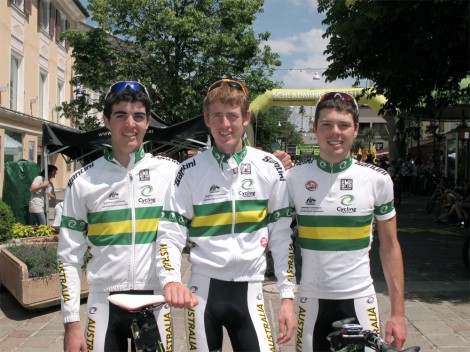Cycling is a diverse sport. Along the competitive spectrum it takes in a variety of disciplines. From track cycling and road racing, to grass track, cyclo-cross and our own sport – mountain Biking. Even here, we have a variety of disciplines. Enough that some mountain bikers may not even associate themselves with other mountain bikers – or at least the differing disciplines seem heavily removed.
Cycling Australia have recently distanced themselves from mountain biking, even at the Elite level. When their High Performance Program was finished, Mountain Bike Australia had to step up to fill the role of developing our elite mountain bike riders.
One person who is heavily involved in the development of our current and future Elite cyclists is Chris Clarke, Mountain Bike Australia’s (MTBA) National Sporting Director. Clarke is currently leading four of Australia’s first year under 23 riders on a six week development trip in Europe. Their racing schedule has taken in two World Cups, the Alpentour Trophy in Austria, and will then move onto more top level racing in Austria and Switzerland. I caught up with Clarke in Schladming, in the middle of the four day Alpentour Trophy, to ask him what was involved with his role in developing our Elite riders.
“I’ve got to oversee the Elite end of mountain biking, and that includes Cross Country from Elites down to the Juniors, plus Downhill and Four Cross. It’s important to make sure we have development processes in place for everyone.”
Clarke started work with MTBA two years ago as the National Technical Director, overseeing and helping with the support around National Series Events, and also as the National Co-ordinator for Downhill and Four Cross. Additionally, Clarke has a long history of racing himself. So he has a strong foundation of knowledge for his current position.
There is no messing around with the current program. The Australian Sports Commission are funding targeted sports, with the goal of putting people on podiums, and achieving Olympic medals. Cycling is one of their targeted sports, and Olympic Distance Cross Country is a big goal.
“Cycling has always been a strong medal provider, so it allowed us to get some more funding into MTBA. We were handed the reigns from CA (Cycling Australia) and told to take care of it. We need to be putting people on podiums at World Champs and the Olympic Games. So we decided we needed to be starting afresh.” With that in mind, Clarke has brought over four first year Under 23 riders.
“We’ve ended up with three that went to Junior Worlds last year, plus we’ve brought in Michael Crosbie. So the four riders are Trenton Day, Cameron Ivory, Kyle Ward and Michael Crosbie.”
Although Crosbie did not represent Australia at the Junior World Championships last year, Clarke said his performance in the National Series this past Australian summer showed that he certainly had something to work with, and deserved a place on the program.
The Alpentour Trophy is a four day stage race, with a significant amount of UCI points on offer. Unlike many bigger stage races, it isn’t a case of four long days traversing a mountain range or region. The race is based out of Schaldming and takes in three punishing 50-75km days in the mountains, plus a hill climb time trial.
“You get four constant days of racing, one after the other. It’s constant development, where the boys can ask themselves what have they learnt today, what can I apply tomorrow. It’s bloody difficult, and it’s a stepping stone to show whether their pre-season was as strong as it needed to be. Then it’s a building block towards their main goals of the World Championships.”
Golden dreams and the search for Australia’s next Cadel
Clarke is building relationships back home too, to build on the development happening overseas. Having a great network of coaches and experienced selectors is helping them hone the requirements for riders, so MTBA can decide where to go form here.
“We’ll sit down with the other selectors later this year. We have acquired John Armstrong, who has come from a coaching background who is now our Chairman of Selectors. We’ll really look at what are the results from what we have put in this year. What has worked, what hasn’t worked, what are the areas we can improve on, so we can make sure we have a good development system in place, for when the next Cadel Evans comes along.”
The time frame for results was initially more long-term, with 2020 being a goal Olympic year. But that has been brought forward to 2016, which puts more pressure on the program that Clarke is running.
“The boys we have now are very committed. They know they are constantly being assessed, and at the end of each year we might be taking the next guy in line. If we’re not producing medal-winning performances, we’re not going anywhere.”
Despite the need for a deep field of talent, there isn’t a move towards talent scouting in schools are sports clubs, which in the past has been a task undertaken by the Australian Sports Commission with the appropriate sports governing body.
“Cycling Australia has been handed that talent development role, but they seem to have made it clear they don’t want to look into mountain biking. It’s too much of a drain, and they would like to leave it to MTBA. We just don’t have the time and resources to be able to put a program like that into place. That’s why this year we’re looking so heavily into the Junior Program. And with the Under 23 Elite Development program in place, we can start to show there is a path there for our Juniors.”
So this is a sign that Australia’s Elite MTB development is starting afresh. Clarke and MTBA are looking down to the Under 17’s and under 19’s, and making sure there are pathways in place, with the appropriate support.
With a recent UCI review via the large trade teams and National Federations, there has been a de-emphasis on the XCM (Marathon) races at the UCI level. The XCM World Cup is no longer running, but its main demise has been to not being an Olympic Discipline.
“The Australian Sports Commission mostly looks at (Olympic) medal opportunities, and Marathon doesn’t provide it. Unfortunately, neither does Downhill or Four Cross. Last year we had huge results in Downhill and Four Cross, but it barely registers with the ASC” remarked Clarke. “But the stage race here in Schladming helps with UCI points and improving Australia’s ranking. Especially the young guys who are first years, they can grab a few points and start building from there.”
From here, Clarke is waiting to see how the boys pull up from the hard racing, before deciding where to go next. With so many opportunuties around them in Europe, it’s a case of letting them recover, and see where they head to next.

